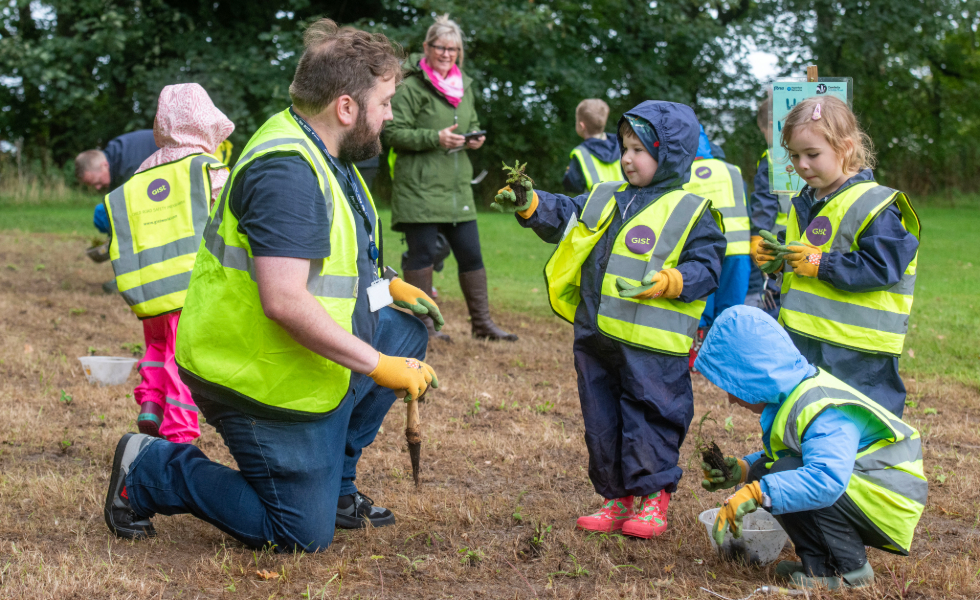Pupils Plant Wildflowers for a Greener Future in Cumbria
2 weeks ago • 1 min read
Children in Lowther planted wildflowers with Cumbria Wildlife Trust as part of a Fibrus-funded initiative to restore pollinator habitats.

Pupils at Lowther Endowed School & Little VIPs Daycare attended a community planting day in Lowther Village organised by Eden Housing Association, as part of Cumbria Wildlife Trust and Fibrus’ collaborative project Get Cumbria Buzzing, Not Buffering. The project, funded by Fibrus, aims to involve the local community in increasing wildlife habitats in the area.
Through the wildflower planting day, the children were able to learn about nature in their own community and gain a deeper understanding of ecological systems and the significance of preserving the environment.
Michelle Clark, Headteacher at Lowther Endowed School & Little VIPs Daycare, believes the project is a great way for the children and Cumbria Wildlife Trust to encourage wildlife into the local habitat.
“Reception, Year 1 and Year 2 pupils have joined the Cumbria Wildlife Trust to help plant, encouraging them to be a part of nature and the local community.” she said.
The children worked in small groups to plant the wildflowers, while members of the Cumbria Wildlife Trust taught them about the positive impact that the wildflowers would have on the area.
Through a two-year partnership, Fibrus has contributed £150,000 to support Cumbria Wildlife Trust in creating sites for pollinators across the county. As part of this, the Trust is running the community planting days, as well as pollinator identification and training sessions as part of the initiative.
Charlotte Rankin, Pollinator Conservation Officer at Cumbria Wildlife Trust, said: “Through funding from Fibrus we’ve been able to work across 15 community sites to create areas of flower-rich habitat for both pollinators and people to enjoy.
“We’ve lost over 97 per cent of our flower-rich habitat across the UK and every area we bring back brings a lot of benefits to pollinators such as bees, moths, and wasps. What’s really nice about this partnership is that the community is involved in the planting, so they can take stewardship and ownership of the areas and hopefully benefit from them in the future. Hopefully, from next year, they can come back and see the wild flowers that they helped plant and see some bees and butterflies enjoying the flowers as well.”
Eden Housing Association was involved in selecting the area for the planting, as Compliance & Facilities Manager Joanne Crone explained: “Our tenants have been clear that they want us to do more to help bees and other pollinators throughout Eden.”
“Wild Lowther has been our first project and we’ve been delighted to work with residents, Cumbria Wildlife Trust and our grounds maintenance contractor Alan Milne, who will look after the meadow. The financial support from Fibrus has been very helpful and we’re looking forward to creating more diverse habitats across our estates in Eden.”
Libby Bateman, External Stakeholder Manager from Fibrus said: “We’re pleased to be able to support this project, which not only helps restore vital habitats for pollinators but also gives young people and local residents a chance to connect with nature in a really hands-on way.
“We’re proud that alongside helping to connect tens of thousands of people in rural Cumbria to gigabit-capable broadband through the Government’s Project Gigabit, Fibrus is also playing a part in creating a greener future for Cumbria.”
Local Lowther village resident, Pauline Price, highlighted: “It’ll be good to see the wildflowers next year and it’s also good to see the improvement in the biodiversity of the village and help with the insects and plant life.”
The pupils themselves said the day was important so that “all the insects get some food” and “to do some wild flower planting to help nature”.
Share article
Recent Articles
Project Stratum reaches halfway mark with full fibre broadband roll out
3 years ago• 2 mins

7 Movies to watch this Halloween
3 years ago• 4 mins
Fibrus awards £55k to help address digital poverty
3 years ago• 2 mins

Why is rural internet slow and how can it be improved?
3 years ago• 4 mins
